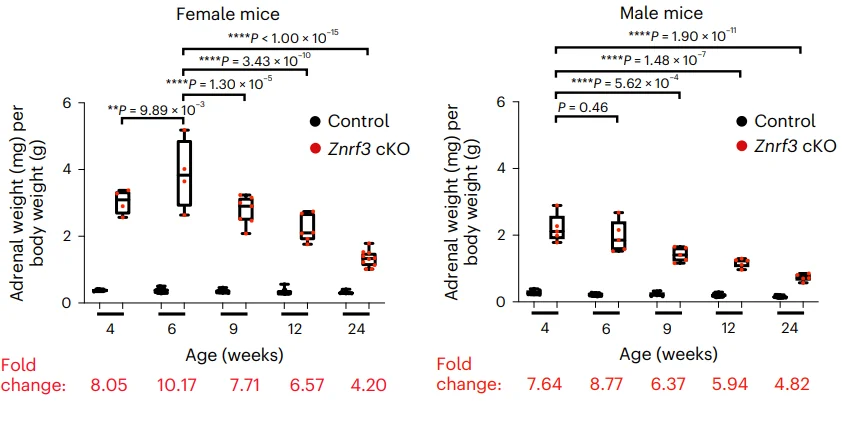A paper published today in Nature Aging has explained a relationship between cellular senescence, cancer of the adrenal glands, and sex differences.
A closer look at age-related cancer
Over 90% of cancer diagnoses are made in people over a half century old [1]. This is not just because of genomic instability leading to cancerous mutations; the tissue microenvironment also plays a strong role, including the immune system, oxygenation, nutrient availability, and the extracellular matrix [2, 3].
To study this phenomenon more closely, the researchers chose adenocortical carcinoma (ACC), a cancer of the adrenal glands that is considerably more common in women and has no truly effective treatments [4]. ACC incidence peaks around the age of 50 in people [5], which is roughly equivalent to 12-18 months in mice [6].
Previous work has connected ACC to the Wnt pathway [7], specifically a loss of function of ZNRF3, a gene that promotes the turnover of Wnt receptors [8]. Without this gene, Wnt receptors go out of control, promoting hypersensitivity to Wnt and driving tumor growth.
Results, both expected and unexpected
The researchers created a population of mice that had ZNRF3 specifically knocked out in the kidneys. They expected that these mice would go on to develop abnormal adrenal gland growth, which would then rapidly develop into cancer. The former happened, but not the latter: after a period of abnormal growth, the glands regressed in size instead of becoming cancerous.

These results were not found to be caused by cellular death by apoptosis. Rather, the proliferation rate, which was rapid at younger ages, was swiftly attentuated at 9 weeks in females and 6 weeks in males. RNA sequencing results showed that the ZNRF3-knockout animals had indeed accumulated significantly more genetic damage than the control group, but this damage led to a cessation of growth instead of cancer.
Cessation of growth and cellular senescence are very strongly linked, so the researchers looked for markers to see if this was occurring. That hypothesis was supported by the evidence: multiple well-known biomarkers of senescence, including p16, p21, and SA-ß-gal, were all increased. As expected, these senescent cells were secreting the SASP, a cocktail of chemicals that is known to encourage inflammation and further senescence. Immune recruitment was higher in males than females.

Read More
Interestingly, knocking out ZNRF3 later in life had the original expected effect: older mice given this knockout developed adrenal tumors considerably more than the control group, with males having nearly entirely benign tumors and females having far more malignant ones.
The role of androgens
The researchers then sought to answer a key question: why were male and female mice responding so differently? Previous work had found that androgens, the chemicals responsible for male development, discourage cellular proliferation in the adrenal gland [9]. Here, the researchers found that androgens affect the way the immune system responds. Myeloid immune cells, which are often excluded from these tumors, were found to be key in suppressing them, and androgens were found to be key in recruiting these cells.
A road to treatments?
This research offers some potential avenues to explore for treating ACC. Androgen administration could be key in eliciting the right immune response. The researchers also note that it may also be possible to drive the cancer cells senescent and then, to prevent them from returning to growth, kill them off with a senolytic. As the current standard of care involves chemicals that are known to induce cellular senescence, this line of inquiry may result in near-term benefits.
Literature
[1] Siegel, R. L., Miller, K. D., & Jemal, A. (2018). Cancer statistics, 2018. CA: a cancer journal for clinicians, 68(1), 7-30.
[2] Phillip, J. M., Aifuwa, I., Walston, J., & Wirtz, D. (2015). The mechanobiology of aging. Annual review of biomedical engineering, 17, 113-141.
[3] Rozhok, A., & DeGregori, J. (2019). A generalized theory of age-dependent carcinogenesis. Elife, 8, e39950.
[4] Crona, J., & Beuschlein, F. (2019). Adrenocortical carcinoma—towards genomics guided clinical care. Nature Reviews Endocrinology, 15(9), 548-560.
[5] Else, T., Kim, A. C., Sabolch, A., Raymond, V. M., Kandathil, A., Caoili, E. M., … & Hammer, G. D. (2014). Adrenocortical carcinoma. Endocrine reviews, 35(2), 282-326.
[6] Flurkey, K., Currer, J. M., & Harrison, D. E. (2007). Mouse models in aging research. In The mouse in biomedical research (pp. 637-672). Academic Press.
[7] Nusse, R., & Clevers, H. (2017). Wnt/ß-catenin signaling, disease, and emerging therapeutic modalities. Cell, 169(6), 985-999.
[8] Hao, H. X., Xie, Y., Zhang, Y., Charlat, O., Oster, E., Avello, M., … & Cong, F. (2012). ZNRF3 promotes Wnt receptor turnover in an R-spondin-sensitive manner. Nature, 485(7397), 195-200.
[9] Grabek, A., Dolfi, B., Klein, B., Jian-Motamedi, F., Chaboissier, M. C., & Schedl, A. (2019). The adult adrenal cortex undergoes rapid tissue renewal in a sex-specific manner. Cell stem cell, 25(2), 290-296.




